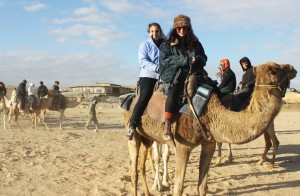By Melanie Rockoff
rockoffm@grinnell.edu
Anxious to break from the tedium that often defines the five long, icy weeks of winter break, several current and former Grinnellians trekked to Israel earlier in the month to participate in Taglit-Birthright Israel. The ten day, all-expense-paid excursion affords Diaspora Jews across the globe the opportunity to explore Jewish culture and identity while strengthening a connection to the State of Israel.

“It’s such an important country and it’s kind of crazy that it’s only the size of New Jersey, and yet we still hear about the tiniest of happenings,” said Julia Gerasimenko ’12, a winter break participant in “Israel Outdoors,” an outdoor-oriented Birthright option. “I think that [Taglit-Birthright Israel] really wants to give people of Jewish heritage the chance to see what it’s actually like [in Israel]. To actually see the living, breathing State of Israel really shows how [Judaism] is more than a religion—it’s also a culture. And to actually see that in person was really powerful.”
Applicants to the Birthright programs must be between 18 and 26 years of age with little to no previous experience in Israel. While much of programming is organized by region, Taglit-Birthright Israel also offers “niche trips” that cater to more focused groups, including the option of an “LGBTQ Friends & Family.” The extended scope—beyond purely religious exploration—surprised many of the particpants.
“The craziest thing for me about going to Israel was how different Judaism was there. [I saw] a lot of Israelis that identify as Jewish but were hardly religious,” said Julie Podair ‘12. “They have a Jewish culture that is very apparent and very strong, but it’s not necessarily religious. It made me feel more okay with not being so religious.”
The trip is not without controversy, however. While proponents praise Taglit-Birthright Israel’s ability to invigorate Jewish identity and strengthen a connection to the State of Israel, critics decry the program as Zionist and one-sided regarding its treatment of the ever-contentious Israeli-Palestinian conflict.
“I can see why the Israeli government would want to support [Taglit-Birthright Israel] because a lot more people were pro-Israel in the end,” said fellow “Israel Outdoors” participant Zach Butler ’13. “But our tour guide tried to present either a neutral opinion or both sides when talking about the Israeli-Palestinian conflict—not just what the Israeli government wanted us to hear.”
Controversy aside, Taglit-Birthright Israel continues to send approximately 30,000 students per year to Israel from 54 countries around the world, according to the program’s official website. Whether a 10-day trip to Israel for Diaspora Jewish youth can be considered a “birthright” remains to be determined, but it goes without saying that the country’s rich history and natural beauty present a nearly universal draw to all who visit.
“It was like a free sample of a really nice chocolate—you’re going to want more of it,” Podair said. “I don’t think there was anyone on that trip that didn’t want to go back.”























































